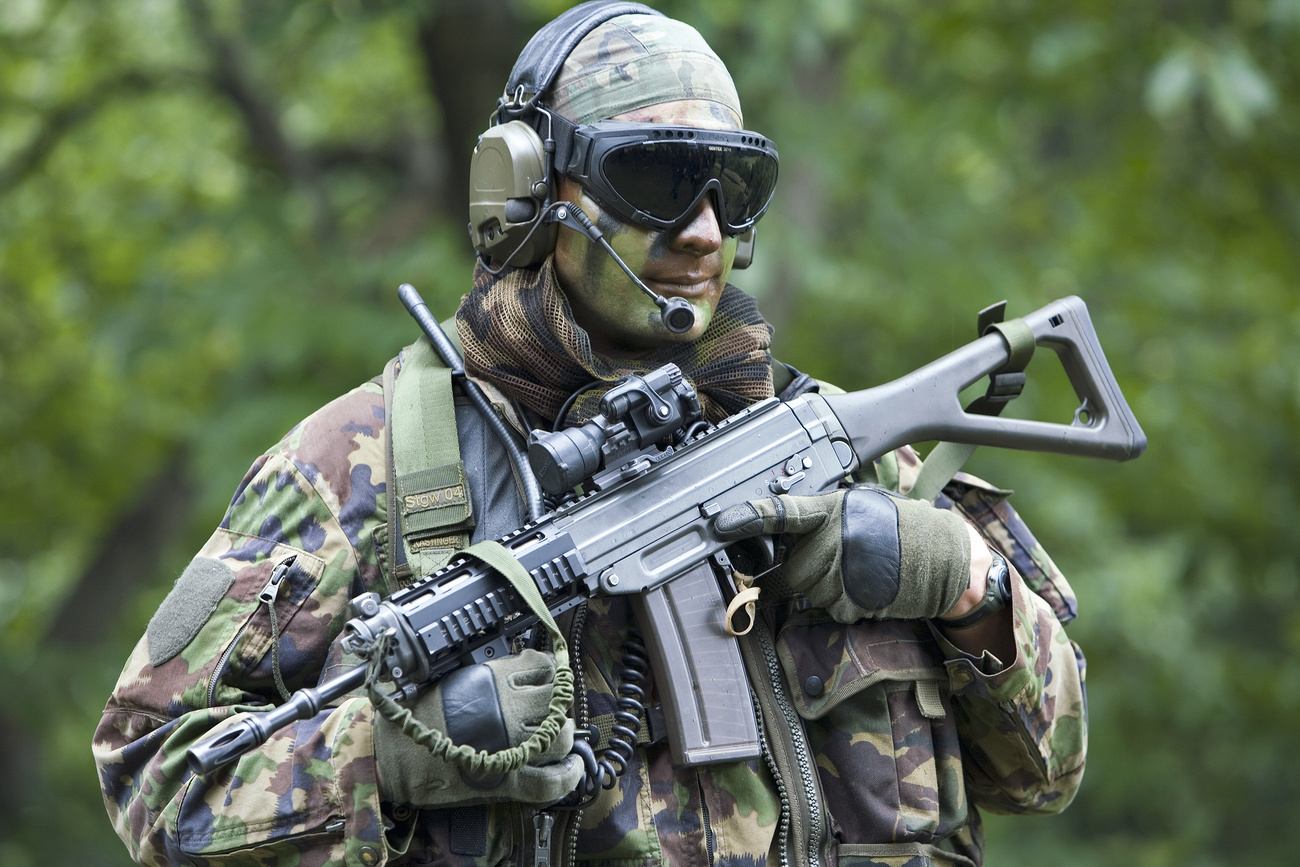
Special forces unit swings into action

The Swiss government has chosen to extend the protection it provides for its citizens and diplomats abroad, specifically in times of crisis.
Since August 1, Switzerland, best known for its militia army and neutrality, has had its first fully operational professional elite special forces unit, known as DRA10.
Angry rioters are attempting to storm the house of a Swiss citizen. Stun grenades go off and tear gas fills the air as special forces battle to keep the mob at bay.
Suddenly a helicopter drops into view, a rope is lowered down and the crack eight-man extraction team rises swiftly into the air with their “objective”, whisked to safety from the rooftop.
“You can take your earplugs out now,” said Major Daniel Stoll, head of Switzerland’s new special forces unit, at the end of the demonstration at an army training camp near Isone in the southern canton of Ticino.
DRA10’s mission is to protect Swiss troops and citizens abroad who face increased security threats; to save and repatriate Swiss citizens caught up in crisis situations abroad and to gather key intelligence concerning such operations.
“It’s a milestone of the Army 21 reform programme,” Luc Fellay, commander of Swiss ground troops, said proudly. “The government now has an instrument to deal with crisis situations that provides a margin for manoeuvre.”
Security via cooperation
The new unit is currently composed of 30 highly trained elite commandos, a number that should rise to 91 by 2011.
DRA10 should be compared with special forces’ units in similar-sized countries, such as Norway, Finland, Sweden or Austria, according to Stoll, but not with those of big military powers.
In the past there were no commandos to call upon “whenever Swiss citizens abroad had to be evacuated, such as in Lebanon last year”, he said.
“Until now, Switzerland always looked to collaborate with neighbouring countries but could never contribute troops,” Stoll told swissinfo. “In the future we will be able to contribute a small number of troops to help neighbouring countries in multinational evacuation operations of Swiss and other European citizens.”
Earlier this year, the Swiss commandos took part in “Exercise Cold Response 2007” in Norway, alongside tactical forces from 15 other countries, to make sure they were up to scratch.
“Security via cooperation” is the army’s current catch phrase. But cooperation with other countries goes beyond security principles, as in an emergency Switzerland will continue to rely on its neighbours for help with air transport.
Crack troops
So just who are these crack troops prepared to risk their lives to rescue Swiss diplomats and holidaymakers in trouble?
Stoll points out that they are no Rambos. The unit is a real mixture: “from janitor to university graduate; father to student; aged between 22 and 36”.
“Most do it for idealistic reasons; they want to do a special job or fulfil a special mission for Switzerland,” he explains.
The army can draw on its huge pool of reservist army recruits to find candidates for its special forces unit. Since 2003, around 300 people apply to join the elite force every year.
But the highly rigorous selection process, involving both mental and physical testing, “marching, swimming and then having to take tactical decisions – showing your communication skills under stress after hard physical activity”, whittles them down to only ten.
Those who make it through the selection process then face a punishing 18-month basic training course, jumping out of planes, climbing snowy caps and undergoing psychological instruction among other things.
They then sign up for five years’ adventure, hanging around on standby – and anonymity.
“It’s hard. I can’t really talk about it, even with family members,” explained one commando. “I just say I’m in the army.”
swissinfo, Simon Bradley in Isone

More
Militia army
During the Cold War, the Swiss Army numbered 600,000 men who could be called up at short notice.
In 1995 the army was reduced to 400,000 and today it is 220,000.
Today, able-bodied males between the ages of 20 and 36 must serve 260 days of military service.
Military service is optional for women and Swiss living abroad.
The DRA10 Detachment is an elite special forces unit belonging to the Reconnaissance and Grenadiers Division, alongside the grenadiers’ and parachute regiments and a specialist air transport unit.
The DRA10’s missions are to protect Swiss troops and citizens abroad who face increased security threats; to save and repatriate Swiss citizens caught up in crisis situations abroad and to gather key information concerning such operations.
Work started on building up the unit in 2003. There are currently 30 trained professional soldiers, which should rise to 91 by 2011.
Training lasts 18 months for members of the DRA10, compared with 25 weeks for grenadiers and 43 weeks for members of the parachute regiment.
Cost of unit (91 members): SFr16million ($19.2 million) per year.
DRA10 will be presented to the general public as part of Army Day 2007 to be held in Lugano from November 20-25.
50 press-ups
60 sit-ups
10 pull-ups
5km cross-country run in under 24 minutes
8km walk in full combat gear (15kg pack) in less than 58 minutes
25km walk in full combat gear (25kg pack) in less than 3.5 hours
300m swim in under 10 minutes

In compliance with the JTI standards
More: SWI swissinfo.ch certified by the Journalism Trust Initiative





























You can find an overview of ongoing debates with our journalists here . Please join us!
If you want to start a conversation about a topic raised in this article or want to report factual errors, email us at english@swissinfo.ch.